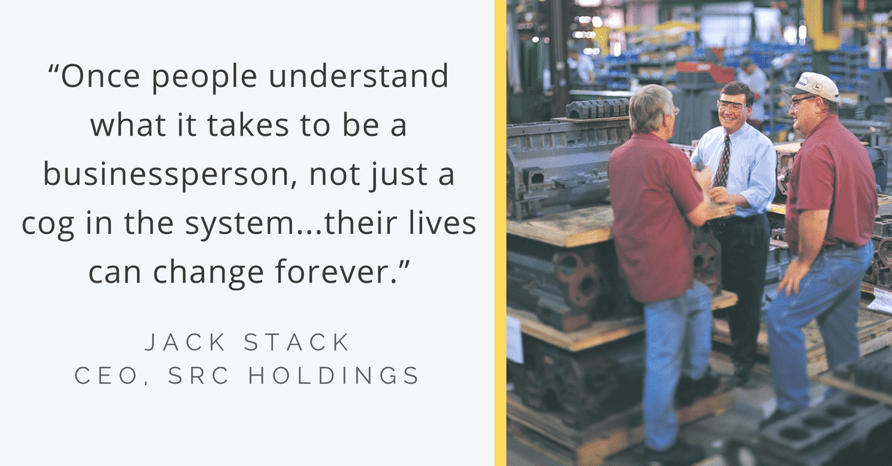How Does the Culture of an Employee-Owned Company Differ From That of a Traditionally Owned Company?
Contrary to popular belief, just because a company is employee-owned doesn't mean that the culture will be positive. Just like a private or publicly held company, a positive workplace culture takes time and a concerted effort. Ultimately, ownership needs to be taught.
There is a common belief that Employee-Ownership is all about owning stock. We hear it over and over again - “I gave my employees ownership, but they just don’t seem to care.” Equity-sharing certainly plays a critical role, but you don’t get an ownership culture simply by giving stock to employees. This thought process can lead to disappointment and misunderstanding.
People must understand that they have a direct role in creating the kind of workplace culture they want. You want their brains, as well as their skills, to help build a great company. Teaching associates how to think and act like owners continue to take a lot of work and intention.
Building a strong employee-ownership culture through shared values and vision is at the foundation of an employee-owned company, but couple that with the need to understand that building a great company is their responsibility and the ultimate goal of their efforts. That’s what ownership is all about.
What is the Culture of Employee-Owned Company?
 Being an employee-owned company means that the employees of the company have ownership in the business. This ownership can take different forms, such as:
Being an employee-owned company means that the employees of the company have ownership in the business. This ownership can take different forms, such as:
-
Employee stock ownership plan (ESOP): This retirement benefit plan allows employees to own stock in the company. The ESOP holds shares of the company on behalf of the employees and distributes them to the employees as they become eligible.
-
Worker cooperative: This is a business model where employees have an equal say in the decision-making processes and share in the profits of the company.
-
Direct employee ownership: In this model, employees directly purchase shares in the company or are given shares as part of their compensation.
Employee ownership can provide various benefits to both the employees and the company. Employees may have a stronger sense of ownership and commitment to the company, which can lead to increased job satisfaction and productivity. The company may benefit from a more engaged and motivated workforce, increased employee loyalty, and potential tax benefits associated with employee ownership.
But as we stated before, having an employee-owned company doesn't mean that you have an ownership culture. You know, a culture that emphasizes a sense of ownership and accountability among employees. In an ownership culture, employees are encouraged to take ownership of their work and are empowered to make decisions and take actions that benefit the company.
Employee-owned companies who educate, empower, and engage their people, build the value of their stock, and deliver significant financial rewards to their associates, not simply because they created an ESOP. Instead, it was because they built a “Business of Businesspeople” who think and act like owners by teaching them the numbers, holding each other accountable, keeping score, and then sharing in the rewards (what we call A Stake in the Outcome).
An ownership culture is often found in employee-owned companies, where the employees have a direct stake in the success of the business. However, it can also be fostered through various initiatives and strategies in other types of organizations, including private and publically held companies, by building an ownership culture that educates, empowers, and engages everyone in the workforce.
How Does the Company Balance the Needs of Individual Employees with the Needs of the Company as a Whole?
 Just giving someone stock doesn’t mean they understand what they have. Stock won’t produce a company of owners or a culture of ownership all by itself. If people don’t recognize the opportunity they have to create some financial security for themselves and one another, they won’t be motivated by it, and you will have a hard time balancing individual employee needs with the goals of an employee-owned company.
Just giving someone stock doesn’t mean they understand what they have. Stock won’t produce a company of owners or a culture of ownership all by itself. If people don’t recognize the opportunity they have to create some financial security for themselves and one another, they won’t be motivated by it, and you will have a hard time balancing individual employee needs with the goals of an employee-owned company.
Stock doesn’t change anybody’s behavior, at least not overnight. People don’t suddenly put their differences aside and join for the common good just because they’ve become owners. If you’ve spent your entire adult life focusing on a job description, it is difficult to stop thinking like an employee and start thinking about what is best for the company as a whole.
That’s why equity in the absence of business education, accountability, empowerment, and transparency often becomes stale and begins to generate a sense of entitlement on the part of the associates. The remedy is to empower people by encouraging them to actively create value for themselves.
You see, when you have a business full of businesspeople all working for a common goal, you don't have to worry about balancing the needs of individuals against the needs of the company as a whole because your employees are doing that naturally.
How are Decisions Made in an Employee-Owned Company, and How Does this Affect Workplace Culture?

How can we expect our people to think and act like owners without first understanding how business works, what’s critical to success, and how they can make a difference? An Ownership Culture is built on mutual trust and respect. You need to break down the walls and hype that make business an elite sport for the select few at the top that keep everyone else in the dark and out of the money. And you can do that when everyone throughout the company is engaged in frank, open, and honest communication about the state of the business.
You have to show people that ownership means opportunity, not exclusion. With ownership, they can go as far as their talent, will, and energy can carry them. They won’t be blocked by class distinction, bogus barriers, or someone else’s decision to keep them out of the club.
You can create this dynamic by opening the books and teaching every employee-owner the fundamentals of financial literacy. The key is to help each associate establish a direct line of sight into how they impact their company’s performance and value. When you open your books—really open them—you also open the minds of your employee-owners, and neither their minds nor your books will ever be closed again.
This is truly where the magic lies. Implementing decision-making processes in an employee-owned company culture sometimes means letting go of control and trusting in your people. A workforce that is educated, empowered, and engaged will make the business decisions at their level of business freeing up the leadership to work on the business instead of day-to-day working in the business.
What Role Does Transparency Play in the Culture of an Employee-Owned Company, and How is this Implemented?
According to a research report by Brad Rawlins, published in Public Relations Journal, transparency is an essential element for building trust. In business, transparency is demonstrated through a company culture that encourages the open sharing of information and accountability at all levels. Organizational transparency must be concretely backed by company policies and decisions rather than just being a vague, empty saying or catchphrase.
We all know why trust is paramount in our personal lives, but why do we need to create trust and openness in the workforce? In order to build a family culture and the kind of company people want to work for, managers and leaders must share information on the company’s direction, strategies, and financial outlook.
Creating an open business environment encourages employees to look out for the company’s best interests and to act in a way that engenders even more trust. The true objective of transparent business practices is to support the greater good of the business by improving manager/employee relations. This creates a culture of value where employees know what they are working for, feel valued, and are able to deliver results that support continual and sustainable company growth.
How Does the Company Promote and Maintain a Sense of Ownership and Engagement Among Employees?
Maintaining a sense of ownership and engagement in an employee-owned company is not rocket science...it's really more neuroscience. First outlined in the NeuroLeadership Journal, the psychological concept of SCARF describes the drivers of human social behavior in the context of a work environment. SCARF is an acronym for five human experience domains: status, certainty, autonomy, relatedness, and fairness. These domains are the greatest motivating factors in improving a workforce, and the principles and practices of The Great Game of Business can help deliver them.
Status
Open-book management can elevate an employee's perceived status by giving them the feeling that they are in a unique group and privy to information that people at other organizations are not.
Certainty
Certainty refers to the ability to perceive what is to come. A big part of opening the books involves forecasting future financial numbers. This awareness breeds engagement by giving employees a preview of what to expect, and people will make sure they do their part to hit these numbers and maintain this feeling of certainty.
Autonomy
When people are given a sense of control, they understand that they are responsible and can’t put the blame on others. This autonomy creates accountability and a feeling of pride for an individual who knows they have helped create a successful outcome.
Relatedness
Relatedness refers to shared goals. At the center of open-book management is the idea of rallying around a common cause and everyone assessing how they can do their part to accomplish the goal.
Fairness
Regarding fairness, open-book practitioners use transparency to open up aspects of company operations that had previously been shrouded in secrecy. The Great Game™ operating system leverages the psychology of motivation to maximize employee engagement.
How Does the Company Ensure That all Employees Feel Valued and Have a Say in the Direction of the Company?
 When talking about ownership, we refer to the mindset—the behavior and the attitude. If you want employees to think and act like owners, you must treat employees like owners. You must involve them in the business much like owners are involved. You must ask everyone to understand the business, set goals, make a plan, take responsibility, and even share in the risk. And if they are successful, they should also share in the rewards. That is how you sow the seeds of true engagement and create an ownership culture.
When talking about ownership, we refer to the mindset—the behavior and the attitude. If you want employees to think and act like owners, you must treat employees like owners. You must involve them in the business much like owners are involved. You must ask everyone to understand the business, set goals, make a plan, take responsibility, and even share in the risk. And if they are successful, they should also share in the rewards. That is how you sow the seeds of true engagement and create an ownership culture.
All this starts with getting your people in the same game the owner is: The Game of business. It may be the most powerful engagement lever you can pull. You can build a winning culture by creating a business of businesspeople.
Engaged employees take responsibility. They desire to contribute to the success of their team and of the company, and they have an emotional bond with the organization and its mission and vision.
In today’s labor market, people want to be recognized for their contributions and to be valued as individuals. Meeting an individual’s innate need to be individually recognized for a job well done and allowing them to win as a team member improves their levels of satisfaction, involvement, and motivation at work. Allowing employees to contribute to a greater good and valuing their contribution inspires loyalty and commitment. At the end of the day, it’s all about creating a winning company and a company of winners.

.png)

 Being an employee-owned company means that the employees of the company have ownership in the business. This ownership can take different forms, such as:
Being an employee-owned company means that the employees of the company have ownership in the business. This ownership can take different forms, such as: Just giving someone stock doesn’t mean they understand what
Just giving someone stock doesn’t mean they understand what 


